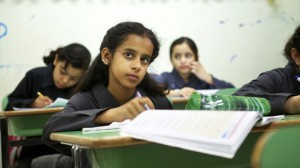 Wadjda (Haifaa Al-Mansour, Saudi Arabia, 2013, 98 min)
Wadjda (Haifaa Al-Mansour, Saudi Arabia, 2013, 98 min)
Sundance Cinemas Screening Room, One week starting Fri Feb 28»
Wadjda is a ten-year-old Saudi Arabian girl who is told that respectable women do not ride bicycles. However, she has no interest in being a respectable woman, so she does everything in her power to get a bike.
Wadjda (2013) is the first feature film shot in Saudi Arabia and also the first made by a female Saudi filmmaker. However, being groundbreaking does not determine quality, and after reading the synopsis I anticipated the film being another inspirational story of a morally-sound underdog overcoming some obstacle. I was pleasantly surprised to find out that Wadjda, instead, challenges a society’s morals by telling the story of a young girl wanting a bike and not understanding why she can’t have one. The pathway the film takes is indirect and hits on multiple characters (mostly women), adding depth of the seemingly simple story line. And conveniently for naive viewers, situating the film through the perspective of a little girl allows the obvious questions to be asked, and then explored.
In many ways Wadjda reminded me of myself when I was ten years old. She makes bracelets, she scribbles on her Converses with permanent marker and she listens to American rock music, which she turns up when her mother yells at her. Wadjda is actually quite badass with her upfront, sarcastic attitude and the tendency to say exactly what she wants. Just like I was, she is a rebellious young tomboy, but unlike me she is told that women have to act femininely. I got away with eating bugs and scrapping my knees, but Wadjda is living under strict control where she is kept from anything boyish. She lives in society where the rules don’t make sense to her.
And so Wadjda acts on her own morals. She pulls money out of her mom’s dresser, but decides to put it back. She eyes up the bike outside of the store, and I thought for sure the film was going to turn into a modern-day Bicycle Thieves, but she resists. However, she does, without hesitation, break the rules that don’t make sense to her, like hiding herself from the presence of men, whether it be with a scarf or not speaking. She understands the morality of not stealing or lying, but fails to grasp the emphasis on modesty.
And her self-created standards slowly influence her mother, who has a strong presence with Wadjda but is overwhelmingly insecure in her relationship with her husband. As Wadjda questions the norms of her surrounding, her mother gradually realizes the unfairness of her own situation. Though she focuses intensively on making herself over to please her husband, her marriage is in jeopardy because she is unable to bear children.
The film deals largely with feminist issues, but it also touches on other themes. For instance, there is a contradiction presented between society’s emphasis on being pure and humble, and its indulgence in consumerism. Money is passed around constantly from character to character. Wadjda’s father plays video games, her mother spends hours putting on makeup and picking out a dress, and even Wadjda is obsessed with a material good, a bike. And the question I could not help but ask was: How can one be virtuous when flooded in materialism? What I got from the film’s portrayal of Saudi Arabia is that is this a country where the laws and standards are stuck in outdated traditions while the people are diverting to modern culture. Wadjda does not hold any connection for religious ideals, and so she is unable to grasp the lessons of her schools and other societal institutions. With a younger generation unconnected to traditional or cultural standards, the only way a society can enforce the same norms is by coercion. This leads to a controlling society.
Overall, the setting of the film is aesthetically pleasing and is captured in beautiful compositions that highlight the hot, basking sun and the contrast between light and dark colors. The acting also needs to be recognized—it’s very natural, especially the performances of Waad Mohammed, as Wadjda, Reem Abdullah as the Mother and Ahd, as the hard-ass Principal, Ms. Hussa.
Since Wadjda is the only film about Saudi Arabia I have ever seen, I am hesitant about accepting everything it presents as fact. However, the film successfully sparks interest in the issues that it raises and it has motivated me to dig deeper into Saudi culture. Perhaps this is because of how easily it is to identify to the film. No only did I related to Wadjda, but to every character who seemingly struggles with the expectations placed on them.
If you miss the limited run of Wadjda at Sundance, check GoWatchIt for information about DVD, Blu-Ray, and streaming rentals.